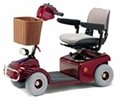
Hypertension in the Elderly
Symptoms, Causes and More
Hypertension in the elderly (also referred to as high blood pressure) is when blood pressure stays elevated at more than 140/90 or 130/80 if you have diabetes, kidney disease or heart disease.
Hypertension is often called the "silent killer" because most people have no signs or symptoms.
The main signs and symptoms of hypertension in the elderly do not occur until blood pressure is dangerously high.
At this time you might see headaches, nosebleeds and dizziness as indicators.
What Does That Number - 140/90 - Mean?
This number refers to your blood pressure:
Top number: (140 in this case) measures the force of blood on arteries when the heart beats.
Bottom number: (90 in this case) measure the force of blood on arteries between beats.
Causes
- Cause is usually unknown
- Narrowing of the arteries
- Fast heart rate
- Kidney disease
- Vitamin D deficiency
- Medications (such as Motrin/Ibuprofin, steroids)
- Thyroid disease
Effects
- Hardening of arteries
- Arterial aneurysm
- Stroke
- Heart attack or heart failure
- Kidney damage
- Chronic renal failure
- Blindness
Who Is At Risk of Developing Hypertension in Elderly?
People who are:
- Older
- Overweight
- Have a history of hypertension in the elderly (high blood pressure) in the family
- More common in African American people than Caucasian people
How Do You Know Someone Has Hypertension?
- Regular blood pressure checks at their physicians office
- Remember blood pressure does vary during the day; at least 3 readings on different days are needed to diagnose high blood pressure
How to Decrease the Risk
Limit Alcohol Consumption
- Heavy drinking (3 or more drinks/day) can damage your heart muscle
- Cutting back to a moderate level of drinking can lower your blood pressure; no more than 2 drinks/day for a male and no more than 1 drink per day for a female
Manage Stress
- High levels of stress can temporarily cause a dramatic increase in blood pressure
- Develop strategies and relaxation techniques to deal with stress
Get Enough Potassium
- Potassium helps lower blood pressure by helping to balance sodium in the body
- Foods high in potassium include: fruits, vegetables, dairy products, fish
Lose Weight If Overweight
- Overweight individuals need more blood to supply nutrients to the body which can put more strain on the heart
- Losing even 10 pounds can lower blood pressure
Follow A Healthy Eating Plan
- Eat more fruits, veggies, low-fat dairy products
- Include whole grains, poultry, fish, nuts
- Eat less fat and red meat
- Decrease sugar intake, sweets and sugared beverages
Limit Sodium/Salt
- Research shows that eating less sodium/salt lowers blood pressure
- Lower your sodium intake by:
- Eating out less often
- Buying fresh, frozen or unsalted canned foods
- Choosing food with less than 400 mg/serving of sodium
- Buying low or reduced sodium or not salt added
- Using less salt
Treatment
Lifestyle Changes
- Healthy eating plan
- Limit sodium and sugar intake
- Achieve a healthy weight
- Exercise/physical activity daily
- Don't smoke
- Limit alcohol
- Manage stress
High Blood Pressure Medications
- Such as diuretics, beta-blockers, ACE-inhibitors and calcium channel blockers






New! Comments
Have your say about what you just read! Leave me a comment in the box below.